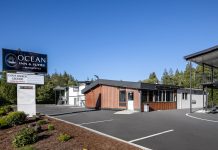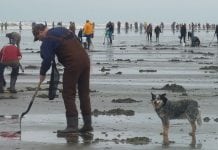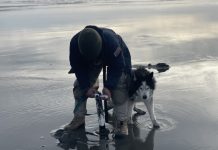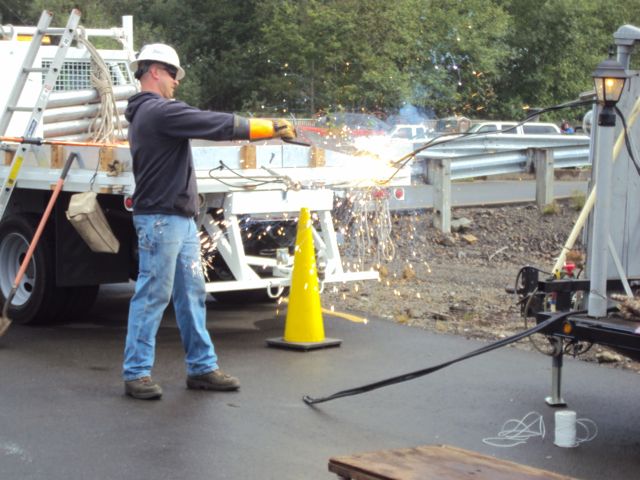
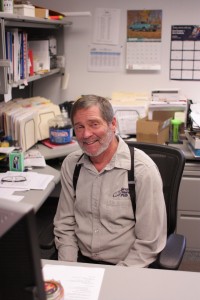
We often take our electricity for granted and assume it will always be available and, when it goes off, are unsure of what to do until service is restored. Often we forget there are whole teams dedicated to keeping our power running in Grays Harbor – men and women of the Grays Harbor PUD who work in the wind, rain and snow to keep our electricity on. Their job is more dangerous than many realize, as is the power with which they work.
Electricity can cause as much harm as it can good if not handled with the proper care and sent through the proper channels. One man survived his car crash into a power pole, but died after attempting to move a downed line. First Responders have been critically injured as they worked on a crash scene, unaware of the danger from fallen lines.
The PUD understands the danger of fallen power lines, and do their best to educate the community at large about electricity and individual safety. Their new acquirement of an Arc Trailer will be a visual tool as they visit schools, fairs, and First Responder meetings to educate the community on the power of electricity and personal safety. The Arc Trailer brings what’s on top of the power-poles to ground level and using special equipment, trained PUD employees will touch random items like ladders, kites and hot dogs to the hot wires. Spectators will be able to feel the heat of this experiment from 15 feet away and then see how the hot dog has been fried from the inside out.
It is an effective visual as people are reminded that electrical burns leave only small, external entrance and exit wounds. It is what happens inside the body as it channels extra pulses of electricity that will cause the most harm. Dale Benner, Safety and Environment Director at the PUD, is looking forward to bringing this Arc Trailer to elementary schools where he already does outreach visits such as Equipment Day with first and second graders. During these visits, Benner gives kids opportunities to ask questions, educates them on electrical safety, what to do when the power goes out, and encourages them in their education.
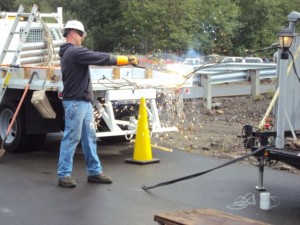
Benner also brings safety education to First Responders who often have to be around fallen, live wires in rescue situations. “Many people believe that a fallen wire is a dead wire,” says Benner. “But a live fallen wire can be very harmful and potentially deadly. This is important information, especially for First Responders who are often more concerned with a victim’s safety than they are their own.”
It doesn’t take a car wreck to bring down live wires. Big storms and downed trees can take out poles and create a safety nightmare. Benner has come across people trying to move fallen lines with a stick after a bad storm. As wood is a conductor of electricity, this is an incredibly dangerous and unwise decision.
So how should the community respond to substantial power outages, fallen wires, or major weather events? With all the talk about earthquakes and tsunamis, being prepared and having safety knowledge can help ease the community’s mind. Ian Cope, the PUD Communications and Government Relations Director, believes that an informed community is a more prepared community. When the power goes out, the focus of the PUD is not just getting it back on as quickly as possible, but also on keeping the community up-to-date about progress. “We have an e-newsletter, Twitter account (@GHPUD), website, and radio presence to keep people informed. Not knowing is unsettling and we believe that sharing what information we can is an important part of our customer service,” says Cope.
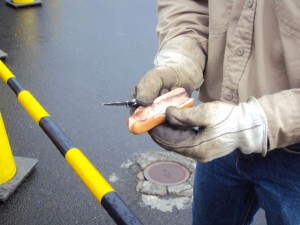
In the event of a catastrophe, storm, or major power outages, the PUD has a couple of different locations in which they store the equipment they need in order to get to work. Contacts and people are in place for collaborating with local governments and maintaining communication with satellite phones. Employees are put in place specifically to answer phone calls from concerned community members.
As PUD employees arrive to fix poles and power lines, Benner strongly encourages community members to avoid those areas and to call with any questions they might have. “Don’t go onto a job site,” says Benner. “They are dangerous and people shouldn’t be nearby. I’ve been out in all kinds of weather and had a tree take out a wire I had just fixed. Instead, call the power house or outage number (360-537-3721).” Benner also encourages people not to assume the PUD knows they are out of power. If your electricity goes out, call and inform them.
Click here for a list of ways to stay informed and connected during power outages.



